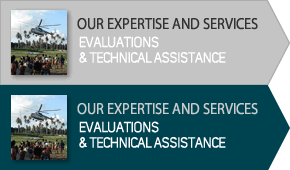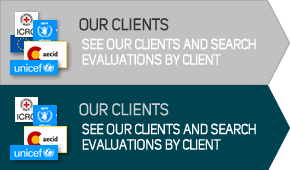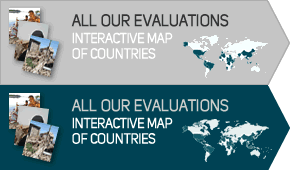The scale and breadth of DARA’s field research and evaluation work gives the organisation an unparalleled overview of what works well and what does not in aid – based on direct experience and evidence from the field:
WFP Operation Evaluation in Iran EVAL
DARA conducted an Operation Evaluation for the World Food Programme (WFP) in Iran. Iran hosts the second largest number of refugees in the world, 95 percent originating from Afghanistan and 5 percent from Iraq. The majority of the refugees live in urban areas [...] Read more...
WFP Operation Evaluation in Somalia EVAL
For over two decades Somalia has suffered from prolonged conflict, protracted crisis and insecurity causing massive damage to human livelihoods and the provision of social services such as health, education, water, sanitation, food and nutrition. In addition [...] Read more...
Study Value for money in the humanitarian sector EVAL
DARA, in cooperation with Indevelop and GRM International, carried out a study on value for money in the humanitarian sector for the Swedish International Development Cooperation Agency (Sida) and one of its long-standing partners in contexts strained by armed [...] Read more...
RTE of UNHCR’s response to the Syrian refugee emergency EVAL
From slow boil to breaking point: A real-time evaluation of UNHCR’s response to the Syrian refugee emergency The evaluation was conducted in June 2013 and was led by a team of independent experts, including Ed Schenkenberg, Chief Executive of DARA, as NGO [...] Read more...
External Evaluation of the Rapid Response to Population Movements (RRMP) Program in the Democratic Republic of Congo EVAL
DARA was commissioned by UNICEF to carry out the External Evaluation of the Rapid Response to Population Movements (RRMP) Program in the Democratic Republic of the Congo (DRC). The RRMP was the largest single humanitarian response programme in the DRC after [...] Read more...
Evaluation of FAO’s role and work related to DRR in Asia, Latin America and the Caribbean EVAL
The purpose was to evaluate the Role and Work of FAO in Disaster Risk Reduction within the overall framework of Disaster Risk Management, providing FAO’s Member Countries and FAO Secretariat with a qualitative assessment of the Organization’s activities in [...] Read more...
Mixed-method impact evaluation of food assistance to protracted Rohingya refugee populations of Bangladesh: 2002-2011 EVAL
The objective of the evaluation was to provide evidence and inspiration for future strategies to improve the contribution of food assistance to increased self-reliance and potentially to durable solutions for both refugees and host populations in protracted Rohingya [...] Read more...
Mixed Method Impact Evaluation The Contribution of Food Assistance to Durable Solutions in Protracted Refugee Situations: Its impact and role in Chad EVAL
The objective of the evaluation was to provide evidence and inspiration for future strategies to improve the contribution of food assistance to increased self-reliance and potentially to durable solutions for both refugees and host populations in protracted refugee [...] Read more...
Phase I Study Research to Assess How Gender Equality Programming influences Humanitarian Outcomes EVAL
The scope of the research is to assess the influence of GEP across the framework of humanitarian action (preparedness, response and early recovery), in key humanitarian sectors (i.e., shelter, health, water and sanitation, food distribution, protection, education [...] Read more...
Evaluation of the performance of SDC instruments in fragile states and conflict-affected contexts EVAL
This evaluation was commissioned as part of the process of considering how to work better in fragile and conflict-affected states. It was set against the backdrop of a new Federal Council Dispatch 2013-2016 (Botschaft), which was the main legal and financial instrument [...] Read more...




Share this